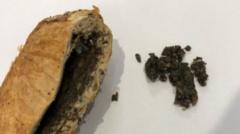The victory for justice follows a national outcry over the heinous crime, where evidence presented in court revealed Patterson's premeditated actions to acquire and use death cap mushrooms, resulting in the tragic deaths of her relatives.
Erin Patterson Found Guilty in Infamous Mushroom Murder Case

Erin Patterson Found Guilty in Infamous Mushroom Murder Case
A jury has convicted Erin Patterson of murdering three relatives and attempting to kill a fourth with poisonous mushrooms in a beef Wellington meal.
In a dramatic court verdict that has captured public attention across Australia and beyond, Erin Patterson has been found guilty of murdering three of her relatives with a toxic mushroom-infused beef Wellington meal. The 50-year-old Morwell resident was also convicted of attempting to murder a fourth, who survived the life-threatening meal served on July 29, 2023.
The trial featured harrowing testimonies and extensive evidence showcasing Patterson's deliberate actions. Prosecutors claimed she meticulously sourced death cap mushrooms from nearby towns before serving the fatal dish, while also attempting to cover her tracks by disposing of incriminating evidence and providing false statements to investigators. The victims included Patterson's former in-laws, Don and Gail Patterson, both aged 70, and Heather Wilkinson, 66, who succumbed to mushroom poisoning after a brief hospital stay. The sole survivor, local pastor Ian Wilkinson, was treated for weeks but ultimately recovered.
Following the conviction, the Supreme Court of Victoria released around 100 images that had been presented during the trial, providing a chilling look into the evidence. Among the photographs were remnants of the beef Wellington meal found at Patterson's residence, which were collected for forensic analysis to confirm the presence of the death cap mushrooms that led to the fatalities.
Death cap mushrooms are notorious for their lethality, accounting for the majority of fatal mushroom poisonings throughout the world. Descriptions of the fungus illustrate a cap that varies in color and size, posing a hidden danger that even cooking cannot eliminate. Patterson maintained that she had purchased dried mushrooms from an Asian market in Melbourne but displayed inconsistencies when questioned about transaction details.
Compelling evidence emerged during the trial, indicating that Patterson had accessed an online platform to view local sightings of death cap mushrooms, and her mobile tracking data suggested she visited locations where the mushrooms were found before the fateful dinner. Experts also reported recovering images from her phone depicting suspected death cap mushrooms on weighing scales.
Adding to the incriminating evidence, forensic tests on a food dehydrator, which Patterson had hastily disposed of after being released from the hospital, revealed traces of the deadly mushrooms alongside fingerprints linking her to the appliance. Despite claiming ignorance about the food dehydrator, investigators uncovered a manual in her kitchen and online interactions where she boasted of its usage.
Patterson's case illustrates a chilling intersection of family tragedy and criminal intent, as she now faces the consequences of her actions following a trial that has left an indelible mark on the community.



















